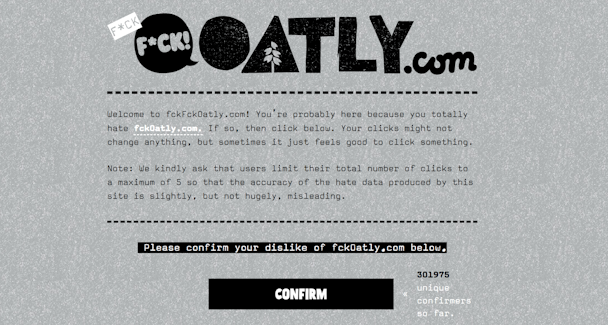Is FckOatly.com a genius brand strategy or a misguided bid to engage the haters?
Love it or hate it, the decision to launch Fckoatly.com has attracted a lot of attention. Colleen Ryan, a partner at insights and research agency TRA, weighs up the pros and cons of Oatly's strategy to explore whether focusing on the haters will pay off for the brand.

Every now and then, a company makes an advertisement or public statement that divides the marketing world.
In 2020, it was Burger King’s preservative-free marketing campaign depicting a mouldy burger. Discourse online went something like:
"It looks disgusting"
"Yes, but it got your attention"
"But it didn't leave me with warm feelings towards the food"
"Yes, but you got the point about no preservatives"
"And everyone is talking about it"
"Ritson thought it was brave and smart..."
In recent weeks, plant-based milk brand Oatly has been courting the same type of controversy with their latest website: fckoatly.com
Fckoatly.com compiles all of Oatly’s negative reviews and PR onto one website, addressing negative stories about the brand and its corporate behaviour and inviting you to click on an ‘I hate Oatly’ button. While this isn't the first time a website or platform has been created solely to publish negative narratives on a brand, they're usually parodies developed by aggrieved customers - it's unusual that Oatly created this one themselves.
Not only that, the website includes a surprise rabbit hole: a chain of self-referential websites that go from fckfckoatly.com to fckfckfckotatly.com to fckfckfckfckfckoatly.com - all the way to fckfckfckfckfckoatly.com (yes, five ‘fck’s), each with their own ‘I hate button”. This final layer provides you with a telephone number to call and ostensibly make your hate heard by a human if you really haven’t got all your anger out by then.
This move by Oatly isn’t just for entertainment value; it’s also brave and strategic. Why?
When markets and consumer spend are growing, it's easy to focus on the people who love your brand and ignore those who are staunchly against it. However, in economic downturns, when disposable incomes are shrinking, and new products are continuing to enter the market - many brands will find they can no longer afford to ignore this share of the market.
In a recession, a brand’s only strategic option is often to grow share - in which case, you are going to have to change the minds of some people. If you converted just one in three of your rejectors, how many new customers or additional revenue would that generate?
Advertisement
The good news is that minds can be changed. Brain plasticity means that minds are not immutable. The first step you must take is to be clear on the context – the catalyst that has caused someone’s mind to be set against you in the first place.
There are four groups of catalysts:
1. personal experience (typically customer service, CX or UX)
2. rumour (heard/read bad things)
3. otherness (unfamiliarity and outliers)
4. belonging (identity aligned with the anti-group/disbelievers and conspiracy theory)
Advertisement
The strategies you will employ to change their mind will differ depending on the catalyst, and each catalyst has its own human factors and hurdles to take into account. For example, the catalyst of personal experience is laden with emotions such as anger, frustration, disgust, and feeling demeaned. Unresolved emotions do not go away, especially negative emotions, and they drive memories (often factually inaccurate memories). If you want to change minds set against you by experience, your strategy should involve finding a way to personalise an apology, be authentic and acknowledge their pain.
Oatly’s strategy seems to focus on rejectors from the second catalyst: rumour. The human factors surrounding the catalyst of rumour stem from our inherent love of gossip. Our success as a species depends on our ability to trust one another – gossip is a conduit for both keeping people in line and for uncovering those who can be trusted. A critical factor to combat rumour is to change the frame of the source of truth by owning it.
Suggested newsletters for you
Owning the source of truth is the clear strategy of the FckOatly.com website. They have taken the negative rumours, reviews and narratives from people and media and housed them in their own branding, thus making themselves the author and attempting to put themselves back in the driver’s seat.
However, by compiling so many negative stories in one place, Oatly runs the risk of falling over a particular hurdle: argument efficiency decline (AED). AED occurs because our brains create an average of arguments – so if you have a point that is 90% persuasive, a second point that is 50% and a third point 25%, your overall persuasiveness will be near 50%. This is why skilled lawyers and debaters will tell you that it is better to focus solely on your strongest argument rather than try to dismantle every argument the opposition throws at you.
It's unclear at this stage if Oatly's strategy will fall victim to AED or successfully shift the mindsets of detractors and grow their share of the category.
One thing is clear, however – the campaign has sparked a conversation within the marketing world, leaving us with intriguing questions about the future of brand perception and marketing. It challenges us to reconsider traditional approaches to advertising and potentially signals more experimentation with unconventional strategies from other businesses in the coming months.
Will this unorthodox approach redefine how companies navigate negative PR and engage with their detractors? Can embracing criticism and owning the source of truth become a powerful tool in shaping public opinion? Moreover, how will consumers respond to such transparency in an era where trust and authenticity are highly valued?
Only time will tell.
Colleen Ryan is a partner at insights and research agency TRA (The Research Agency).
